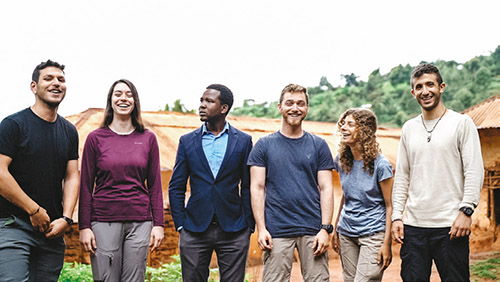

For many Israelis in their early to mid-twenties, the post-army trip to a third world country is a rite of passage in their transition from army to civilian life. During this adventure, young Israeli men and women enjoy their reclaimed freedom while exploring exotic cultures and testing personal limits. Most return home with photographs together with smiling children in distant villages and souvenirs from Third World markets. Few return with a promise to help create a brighter future for the locals they encountered. Jerusalemite Rafi Ryker is the exception.
After spending four formative years in the IDF’s Armored Corps, Ryker set his sights on Nepal or Costa Rica for his post-army experience. But the coronavirus pandemic upended his plans, and in December 2020 he found himself in the only continent that was safe for travel—Africa. He and a friend ended up in the Lushoto region of Tanzania, in a small village known as Malindi that is nestled amongst towering eucalyptus trees and fertile slopes. A conversation in a tea bar one evening with a group of young local teachers would change the course of the remainder of his trip, and his life’s destiny. The conversation ended with an invitation to visit a local school. Ryker accepted the invitation and was disconcerted by the sights he saw—overcrowded classrooms with 100-150 students, crumbling walls and no electricity or running water. The images were etched in Ryker’s mind and when he returned to Israel, he vowed to turn his anguish into action.
Ryker immediately enlisted other former officers and together they raised an initial $15,000 for their first pilot project to renovate a school and create infrastructure for clean water in the village of Malindi. In May of 2021, Ryker led a delegation of eight former Israeli officers to the village of Malindi to execute the project together with the villagers. “It was a huge success, 10 times more than we thought,” Ryker explained with pride. Together they rehabilitated a school that was in danger of collapse. They painted and plastered the walls and built new benches and a playground. They also purchased uniforms for children who couldn’t afford them. Without uniforms, children are prohibited from entering the classroom.
Most significantly, the delegation helped install a pipe system to direct clean water into the school. Women and children would often walk 3 miles in each direction to gather one bucket of unclean water. Prior to the water project, more than one third of villagers suffered from waterborne illness. In just a few months since the installation of the water project, the prevalence of such diseases dropped significantly and many lives were saved. Attendance at school rose and performance in the classroom improved. As a result of this first project, 3,000 individuals now benefit from clean water in Malindi and the local government contributed an additional $20,000 to maintain and expand the project.
Beyond the rehabilitation of schools and the infrastructure for clean water, Ryker is bringing blue and white pride to the depths of Africa. The young Israeli men and women proudly don their “Magen David” necklaces while working in the village, and the locals know very well that it is these ambassadors from Israel to whom they owe their gratitude. Elia Masumbi, the chief of the Malindi village, shared, “The positive mindset that the team from Israel brought helped the villagers start questioning themselves and what they can change about their own future. The team from Israel started a revolution in our region.”
Ryker, who has roots in Teaneck and has spent many visits there with extended family, was raised in a home where the value of giving back was a way of life. As the grandchild of a Holocaust survivor who was rescued by a non-Jewish French family, he is well aware of the impact that one individual can have on another’s life. “We get opportunities in life and this is an opportunity to save lives. There were stages in the history of our people when we needed help. Sometimes we received it, but most of the time we did not. It doesn’t mean there aren’t needs in Israel, but if there is an opportunity to help another nation develop, then I think we need to, as there were times when no one was there for us.”
Ryker is aiming to send two delegations to Malindi this year and to eventually rehabilitate all eight schools in the region, with a potential impact on 40,000 individuals. Once this task is complete, Ryker aims to replicate the work in other regions in Lushoto. He envisions a bright future for Lushoto, with running water and technology and a sustainable environment that is managed solely by the locals. While his greatest challenge remains raising funds, with a great deal of determination mixed with idealism, Ryker is confident that he will accomplish his goals. “I don’t see this as some crazy thing. I was brought up learning that this is the right thing to do and since it’s possible, there is no reason to not do it.”
For more information and to get involved in the Afrikan project, see www.afrikantanzania.com
Alisa Bodner is a Fair Lawn native who immigrated to Israel a decade ago. She is a nonprofit management professional who enjoys writing in her free time.













